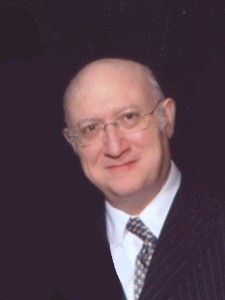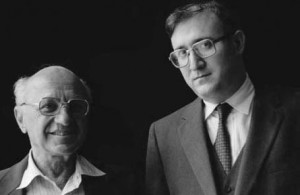
Rabbi Dr. Aaron Levine, 1946-2011
Photos courtesy of the Levine family
In an Orthodox community that has become increasingly fragmented and compartmentalized, Rabbi Dr. Aaron Levine was one of the few halachic authorities who was able to transcend narrow institutional and ideological labels and command respect across the entire Orthodox spectrum. Rabbi Levine, who was chairman of the Economics Department at Yeshiva University for thirty years, published articles on Torah and economics in leading journals of Jewish thought, and served as a guest lecturer on Jewish business ethics at dozens of prestigious universities, symposiums and shuls around the world. He was widely respected in the world of Torah as a unique expert in Choshen Mishpat, the halachot of economics.
His books became standard references on contemporary Jewish business ethics, occupying respected places on the shelves of both Torah scholars and academic libraries. Through these books, Rabbi Levine defined a new academic sub-discipline, and became known as one of the world’s leading economic ethicists.
Nobel laureate in economic sciences Dr. Yisrael Robert Aumann described Rabbi Levine as “the foremost authority in the world on . . . what the halachah has to say about business practices and business ethics.” It was for this reason that Oxford University Press selected Rabbi Levine to edit its comprehensive Handbook on Judaism and Economics, which was published shortly before his death.
Rabbi Levine lectured on marketplace ethics to Wall Street executives and investors. In 1980, he debated the Morality of the Marketplace with Nobel laureate Milton Friedman. Rabbi Levine more than held his own with Friedman, who was considered by many to be the leading economist and debater in his field. In what is still remembered as a stunning display of intellectual prowess, Rabbi Levine presented his closely reasoned arguments from the perspective of an economist, rabbi, and ethicist, showing that Friedman’s own economic theories were themselves rooted in Torah principles.
Rabbi Levine was uniquely qualified for the task of expounding Jewish business ethics by virtue of his distinguished family background, great intellectual capacity, and saintly personality. He was a descendant of European gedolim, including the Chacham Tzvi and the Maharam M’Lublin. He was the great-great-grandson of the Beit Yitzchak, and the grandson and namesake of the Raisher Rav, one of pre-war Poland’s leading Torah personalities and communal leaders. Rabbi Levine was born in 1946, five years after his grandfather was killed in the Holocaust. Raised in Borough Park, young Aaron became the talmid muvhak, star protégé, and eventually the son-in-law of Rabbi Shmuel Dovid Warshavchik, rosh yeshivah of the Rabbi Jacob Joseph Yeshivah (RJJ), then one of this country’s premiere Torah institutions. From 1967 to 1976, Rabbi Levine served as editor-in-chief of the RJJ Torah journal Kol Yaakov.
He earned Yoreh Yoreh and Yadin Yadin ordination from RJJ and a doctorate in economics from New York University. After joining the faculty of Yeshiva University, he won the support of Yeshiva University President Dr. Norman Lamm. In 1987, he was appointed the Samson and Halina Bitensky professor of economics, in addition to his role as chairman of YU’s Economics Department.
Rabbi Levine was also renowned for his conflict resolution skills. He was a paragon of fairness and integrity, and was in great demand as a dayan or arbitrator at the Beth Din of America. He won the admiration of his colleagues for his creativity and remarkable thoroughness in addressing cases, devoting untold hours to meticulously recording his complex rulings in writing.
The force of his Torah personality made an indelible impression on hundreds of students at Yeshiva University. His Yeshiva College class on “Comparative Economic Systems” was a tour de force in the application of Torah principles to the most difficult problems in economics. To three generations of Yeshiva University students, he was an inspirational role model of humility, personal sensitivity, and the very finest middot, reflecting the pervasive influence of the mussar teachings of his rebbe, Rabbi Warshavchik. His personal attention to students was surprising and ennobling, allowing young and often shy students to gain confidence and master the material under the caring tutelage of such an eminent scholar. Rabbi Levine’s gift for making students feel unique was a combination of a generosity of time, a genuine respect for all people, and an animated excitement that infected all who crossed his path.

In 1980, Rabbi Levine more than held his own in his debate with Nobel laureate Milton Friedman, who was considered by many to be the leading economist and debater in his field.
Rabbi Yona Reiss, the dean of YU’s Rabbi Isaac Elchanan Theological Seminary, first met Rabbi Levine when he signed up for one of his classes as a student at Yeshiva College, which was, Rabbi Reiss later said, “one of my best decisions in college.” Later, as the director of the Beth Din of America, Rabbi Reiss worked with Rabbi Levine on beit din cases, and marveled at Rabbi Levine’s integration of Torah into the essence of his character.
“Middot and Torah erudition were not separate planes in Rabbi Levine’s weltanschauung; rather, the hashkafah and the content of Torah, the content and the experience, were inextricably intertwined, both in his teachings and in his character,” Rabbi Reiss said.
Rabbi Shalom Carmy, the editor of Tradition and a fellow member of the YU faculty, knew Rabbi Levine both as an academic colleague and as his long-time mara d’atra. He said, “When I think of the enormous personal and communal loss, it is not his erudition that I mourn, but his character.”
I first met Rabbi Levine almost thirty years ago as the chairman of the rabbinic search committee of the Young Israel of Avenue J in Flatbush, Brooklyn. From the outset, the depth and integrity of his Torah personality was even more impressive than his encyclopedic Torah knowledge and his keen intellect and powers of analysis. For me, his outstanding character was always his rarest and most precious trait. When some of my fellow members asked me why I so strongly preferred Rabbi Levine over other well-qualified applicants for the pulpit, my answer was, “I have two young sons in yeshivah. I want to be able to take them to shul on Shabbos, point to the bimah, and tell them to be like him.”
Indeed, Rabbi Levine quickly became an inspirational role model to our children. Shortly after he became the rav of the shul, Rabbi Levine presided over a bar mitzvah. He gave the celebrating young man a copy of the sefer Birkat Shmuel, explaining that he intentionally gave a very difficult book—one of the hardest—so the boy could strive to understand it. That bar mitzvah boy is now an influential Torah educator, as are an unusually large portion of his fellow congregants who grew up under Rabbi Levine’s influence.
In that same period, Rabbi Levine learned that the popular catering hall which had been booked for the shul’s annual dinner did not have an outside hashgachah, a situation which was not unusual at the time, especially when the caterer involved was known to be an observant Jew and considered to be reliable. When Rabbi Levine insisted that there must be a mashgiach for the shul’s event, the caterer replied that if his demand became known, it would wreck his reputation. After considering this concern for a moment, Rabbi Levine said, “I will be the mashgiach for the shul dinner,” and agreed not to publicize that fact, thus protecting the caterer’s reputation. Rabbi Levine spent most of the night before the shul dinner making sure that everything at the catering hall was done properly. True to his word, nobody knew that Rabbi Levine had done that until many years later, when he related the incident to American Jewish historian Dr. Yitzchak Levine, a member of our congregation.
Most of Rabbi Levine’s personal acts of chessed remain unknown to us, because he would never talk about them publicly. He was always eager to make an extra effort to brighten the lives of his congregants, especially the poor, the ill, the elderly, and the downtrodden, and was content to accept his success in those efforts as its own reward. Since his passing, his acts of kindness and sensitivity have become the stuff of local legend, which will undoubtedly grow as more is revealed
Yaakov Kornreich is an Anglo-Jewish journalist and freelance writer. He writes regularly for Yated Ne’eman and the Jewish Press.